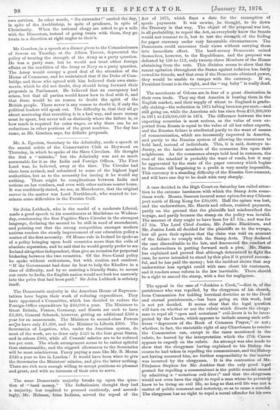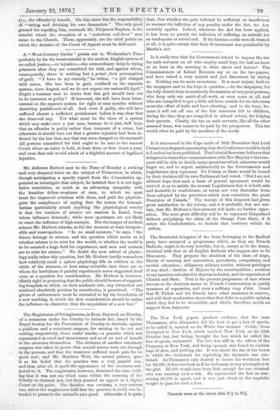The appeal in the case of "Jenkins v. Cook,"—that is,
of the parishioner who was repelled, by the clergyman of his church, from Communion for holding heretical doctrine as to the Devil and eternal punishments,—has been going on this week, but is not yet decided. It seems clear that the legal question will turn on whether or not the rubric which directs the clergy- man to repel all "open and notorious" evil-livers is to be inter- preted by the Canon, which appears to include among such evil- livers "depravers of the Book of Common Prayer," or not ; whether, in fact, the statutable right of any Churchman to receive the Communion can, except in the cases mentioned in the rubric, be barred by the interpretation which the 27th Canon appears to engraft on the rubric. An attempt was also made to show that the clergyman having explained to his Bishop the course he had taken in repelling the communicant, and the Bishop not having censured him, no further responsibility in the matter was incurred by the clergyman. It is the contention of Mr. Fitzjames Stephen for Mr. Jenkins that the only good legal ground for repelling a communicant is the public scandal caused by admitting a "notorious evil-liver ;" and that the clergyman would not even have the right to repel a man whom he privately knew to be living an evil life, so long as that evil life was not a matter of public comment and notoriety, so as to cause a scandal. The clergyman has no right to repel a moral offender for his own
(i.e., the offender's) benefit. On him alone lies the responsibility -of " eating and drinking his own damnation." The only good ground for repelling him, contends Mr. Fitzjames Stephen, is the scandal which the reception of a "notorious evil-liver" may cause to the Church. These, apparently, are the chief points on which the decision of the Court of Appeal must be delivered.



































 Previous page
Previous page